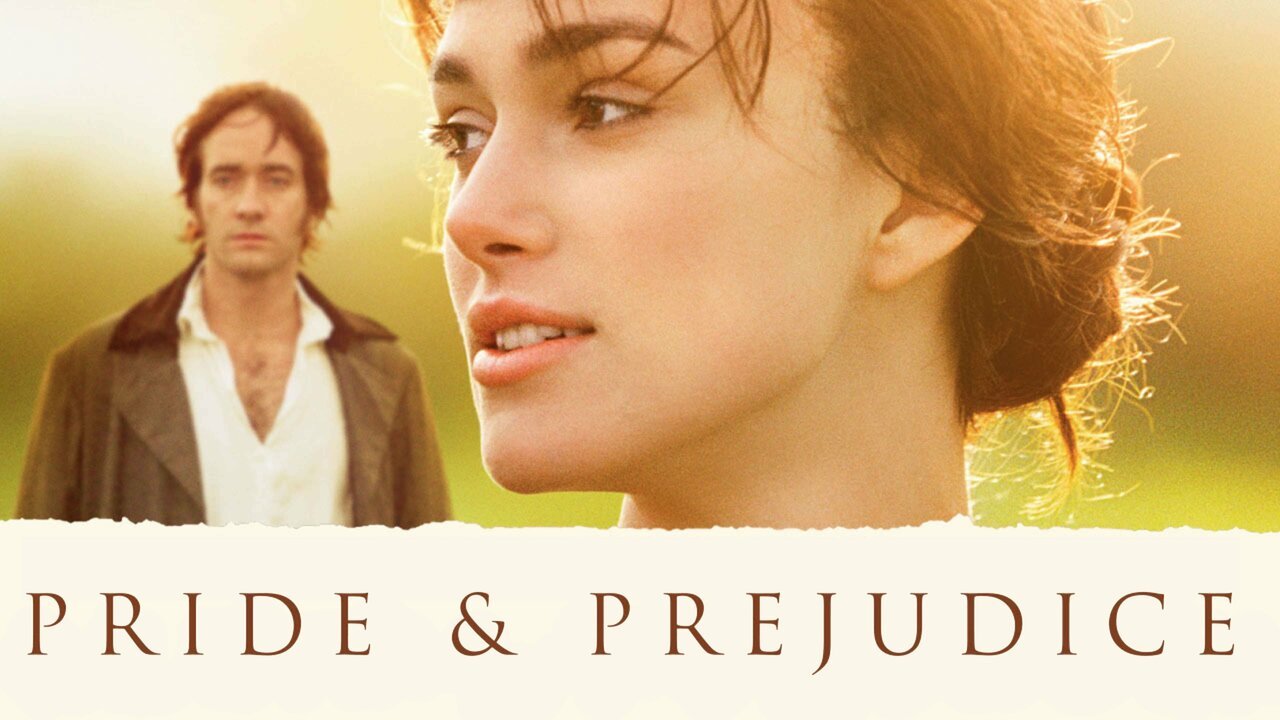Pride & Prejudice (2005)

Pride & Prejudice, directed by Joe Wright and released in 2005, is a critically acclaimed adaptation of Jane Austen’s 1813 novel of the same name. This film brings to life the charming and intricate world of Austen’s Regency-era England, focusing on themes of love, social class, and personal growth. With its rich period detail, strong performances, and a fresh approach to a literary classic, Pride & Prejudice has earned its place as a memorable and beloved interpretation of Austen’s work.
The film is set in the early 19th century and centers around the Bennet family, particularly the five Bennet sisters: Elizabeth (Keira Knightley), Jane (Rosamund Pike), Mary (Talulah Riley), Kitty (Caren Pistorius), and Lydia (Jena Malone). The Bennets are a family of modest means living in rural England, and their story unfolds against the backdrop of societal expectations and the quest for advantageous marriages. The central plot focuses on the complex relationship between Elizabeth Bennet and Mr. Fitzwilliam Darcy (Matthew Macfadyen), two characters whose initial misunderstandings and social differences lead to a journey of self-discovery and romantic fulfillment.
Joe Wright’s direction of Pride & Prejudice is notable for its dynamic and visually striking approach. Wright infuses the film with a sense of immediacy and energy that brings the historical setting to life in a vibrant and engaging way. The film’s cinematography, by Roman Osin, captures the beauty of the English countryside and the intricacies of period settings with a naturalistic and immersive style. The use of sweeping landscapes, intimate close-ups, and fluid camera movements creates a sense of intimacy and connection with the characters, enhancing the film’s emotional impact.
The screenplay, adapted by Deborah Moggach, successfully distills Austen’s novel into a compelling and coherent narrative while retaining the essence of the original text. Moggach’s adaptation highlights the key themes of the novel, including social class, personal integrity, and the transformative power of love. The script skillfully balances the novel’s social commentary with its romantic plot, allowing the characters’ growth and interactions to shine through. The dialogue remains true to Austen’s witty and incisive style, and the film’s pacing ensures that the story unfolds in a way that is both engaging and accessible to modern audiences.
Keira Knightley’s portrayal of Elizabeth Bennet is a standout performance in the film. Knightley brings a spirited and independent energy to the character, capturing Elizabeth’s intelligence, wit, and inner strength. Her portrayal effectively conveys Elizabeth’s journey from initial prejudice and misjudgment to a deeper understanding of herself and her feelings for Mr. Darcy. Knightley’s performance is both nuanced and vibrant, making Elizabeth a relatable and compelling protagonist.

Matthew Macfadyen’s portrayal of Mr. Darcy complements Knightley’s performance with a character that is both aloof and deeply reserved. Macfadyen’s interpretation of Darcy adds layers of complexity to the character, revealing his internal struggles and eventual transformation. His performance captures the essence of Darcy’s growth from a proud and distant figure to a man capable of genuine love and self-awareness.
The supporting cast of Pride & Prejudice also contributes significantly to the film’s success. Rosamund Pike’s portrayal of Jane Bennet, Elizabeth’s elder sister, is characterized by grace and warmth. Pike’s performance highlights Jane’s kindness and gentle demeanor, providing a contrast to Elizabeth’s more spirited personality. Talulah Riley, Caren Pistorius, and Jena Malone also deliver strong performances as the other Bennet sisters, each bringing distinct qualities to their roles and contributing to the film’s ensemble dynamic.

The film’s production design and costumes are meticulously crafted, creating an authentic representation of Regency-era England. Jacqueline Durran’s costume design is particularly noteworthy, with its attention to detail in period-appropriate attire that enhances the characters’ personalities and social status. The film’s attention to historical accuracy in its settings, costumes, and props adds to its immersive quality, allowing viewers to fully engage with the world of Austen’s novel.
The musical score, composed by Dario Marianelli, complements the film’s tone with its evocative and emotive compositions. Marianelli’s score blends classical and contemporary elements, enhancing the film’s romantic and dramatic moments. The music contributes to the overall atmosphere, underscoring key scenes and adding to the film’s emotional depth.

In summary, Pride & Prejudice (2005) is a masterful adaptation of Jane Austen’s classic novel, directed by Joe Wright and featuring strong performances, meticulous production design, and a compelling screenplay. The film successfully captures the essence of Austen’s story while bringing a fresh and dynamic approach to the material. Keira Knightley and Matthew Macfadyen deliver standout performances as Elizabeth Bennet and Mr. Darcy, respectively, and the film’s attention to detail in its historical setting and costume design enhances its authenticity and appeal. With its blend of romance, social commentary, and character-driven storytelling, Pride & Prejudice remains a beloved and enduring cinematic adaptation of Austen’s timeless work.











